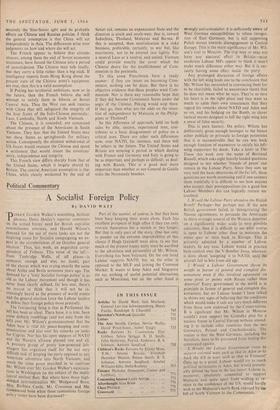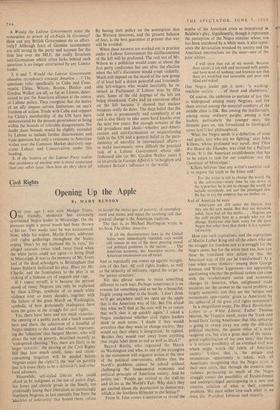Political Commentary
A Socialist Foreign Policy
By DAVID WATT
-DATRICK Gordon Walker's mumbling, hesitant .ice phrases, ,Denis Healey's superior comments on the armed forces' need for British capitalist commitments overseas, and Harold Wilson's demand for the use of more tanks are not the inspiring cause for Socialist campaigning we ex- Peet in the circumstances of an October general election.' Thus, last week, an anguished corre- spondent of Tribune. This voice of the left— from Tunbridge Wells, of all, places—is authentic enough and was, no doubt, part of the chorus which was crying exactly the same about Attlee and Bevin seventeen years ago. The demand for a 'truly Socialist foreign policy' is as old as the Labour movement and though it has never been clearly defined, far less met, there's no reason to think that it will not be in- creasingly heard as the pressure of world events and the general election force the Labour leaders to define their foreign policy more precisely. The fascinating thing is that in Parliament the left has been so silent. There have, it is true, been some definite rumblings (and not only from the left) over Mr. Wilson's pronouncement that the Aden base is vital for peace-keeping and com- munications and also over his remarks on tanks for Cyprus. Nor has his open support of NATO and the Western alliance pleased one and all. A pressure group of pretty low-powered, left- wingers has organised itself for the not very difficult task of keeping the party opposed to any American adventure into North Vietnam; and much the same posse marched in to confront Mr. Wilson over Mr. Gordon Walker's equivoca- tions in Washington :on the subject of the multi- lateral nuclear fleet. But where have those high- minded internationalists Mr. Wedgwood Berm, Mrs. Barbara Castle, Mr. Crossman and Mr. Greenwood been when these contentious foreign policy issues have been discussed? -
Part of the answer, of course, is that they have been busy keeping their noses clean. Each has excellent prospects Of high office if they can only restrain themselves for a month or two longer. But that is only part of the story. One has only to ponder on the extreme improbability of this silence if Hugh Gaitskell were alive, to see that much of the present happy unity must be ascribed to the adroitness and personality of Mr. Wilson. Everything has been balanced. On the one hand Labour supports NATO, but on the other is opposed to the MLF and joining the Common Market. It wants to keep Aden and Singapore (to say nothing of useful potential alternatives such as Mauritius), but on the other hand is.
strongly anti-colonialist; it is sufficiently aware of West German susceptibilities to refuse recogni-
tion of East Germany, but is still supporting Polish moves towards disengagement in Central Europe. This is the main significance of Mr. Wil- son's visit to Moscow. The trip may or may not have any electoral effect in Britain—most moderate Labour MPs appear to think it won't make much difference either way. But it is cer- tainly having some effect inside the party.
Any prolonged discussion of foreign affairs with the left wing leads one to the conclusion that 1Vtr: Wilson has succeeded in convincing them (or to be charitable, failed to unco'nvince them) that he does not mean what he says. They're so sure his heart is in the right place and they want so much to calm their own consciences that they regard his remarks about NATO and Aden and so on, and his hedging on the Bomb, as clever tactical moves designed to lull the right wing into a sense of false security.
This is pure fantasy. On policy, Wilson has deliberately given enough hostages to the future either publicly or privately to foreign potentates that it is inconceivable that he can win back enough freedom of manoeuvre to satisfy his left-
wing supporters by deeds. Take a letter to The Times this week over the name of Bertrand Russell, which asks eight heavily loaded questions
designed to test whether 'friends of peace' can remain in the Labour Party. Since they sum up very well the basic obsessions of the far left, these questions are worth examining and if one answers them truthfully it is difficult to see how anyone who accepts their presuppositions (as a good few Labour Members do) can logically remain un- troubled.
1. Would the Labour Party abandon the British Bomb? Perhaps—but perhaps not. If the new
British government failed, in `denegotiating' the Nassau agreements, to persuade the Americans to share strategic control of the Western deterrent on a significantly wider scale (a very possible outcome), then it is difficult to see what course is open to Labour other than to maintain the
status quo or turn back to Europe. This is
privately admitted by a number of Labour leaders. In any case, Labour would in practice have control over the V-Bomber force, whatever is done about 'assigning' it to NATO, until the aircraft fall to bits from old age:
2.. Would a Labour Government throw its weight in favour of general and complete dis-
armament even if this involved agreement on
some point or points with Russia rather than America? Every government in the world is in
principle in favour of general and complete dis- armament, but no Labour leader I have talked to shows any signs of believing that the conditions Which would make it safe are very much different from those now endorsed by the Conservatives. It is significant that Mr. Wilson in Moscow
couldn't even support the Gomulka plan for a nuclear freeze in Central Europe without amend- ing it to include other countries than the two Germanys, :Poland and Czechoslovakia. The reason is that the West Germans, including the Socialists, have to be prevented from feeling dis- criminated against. 3. Would the Labour Government cease to %If pport colonial wars such as that in Aden or to l,,trk. the US in wars such as that in Vietnam? Only up to a point. Labour would try to reach apbollyitidcea esnedt t Itehnei ebnatsse inn At hdee n, last w t r.! et so would m Labour ur i moreover, absolutely committed to support Malaysia and, quite apart from wishing to re- main in the confidence of the US. would hardly wish to see Malaysia's north flank exposed by the fall of South Vietnam to the Communists. 4. Would the Labour Government resist the restoration to power of ex-Nazis in Germany? How can any British GovernMent do so effect- ively? Although fears of German rearmament are still strong in the party and account for the firm line over the MLF, the really ferocious anti-Germanism which often lurks behind such questions is no longer entertained by any Labour leader.
5, 6 and 7. Would the Labour Government abandon sycophancy towards America. . .? The questions refer specifically to Cuba and Com- munist China. Wilson, Brown, Healey and Gordon Walker are all, so far as I know, deter- mined to put the American alliance at the centre of Labour policy. They. recognise that the duties of an ally impose certain limitations on one's freedom of action. Trade with Cuba and support for China's membership of the UN have been demonstrated by the present government as being within the bounds of tolerable disagreement. No doubt these bounds would be slightly extended by Labour to include further disarmament and trade questions but only a resistance to American wishes over the Common Market decisively sep- arates Labour and Conservatives under this heading.
8. If the leaders of the Labour Party realise that avoidance of nuclear war is more important than any other issue, then how do they shots) it?
By basing their policy on the assumption that the Western deterrent, and the present balance of fear, is the best guarantee at present that war will be avoided.
When these answers are worked out in practice under a Labour Government the disillusionment of the left will be profound. The real test of Mr. Wilson as a politician would come at about the first party conference but one after the election when the left's .discontent would erupt violently. Much will depend on the mood of the new group of at least half a dozen powerful and irreconcil- able left-wingers who would inevitably be re- turned to Parliament if Labour won by fifty seats. Some of the old dogmas of the left are being abandoned. Cuba had an enormous effect on the left because it showed that nuclear weapons really do deter. The deep belief that the cold war is permanently and completely at an end is also likely to take some hard knocks over the next few years. But enough remains of the old prejudices and ideals—whether anti-Ameri- canism and anti-Germanism or unquestioning faith in the UN and a general belief in the para- mountcy of morality in international affairs— to make enormously more difficult the practical task of a Labour Government whose old- fashioned aim (as Mr. Gordon Walker states it in an article in Foreign Affairs) is `to heighten and enhance Britain's influence in the world.'







































 Previous page
Previous page